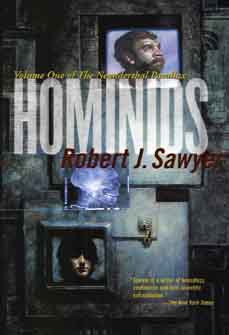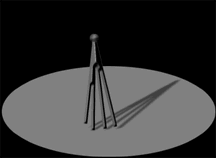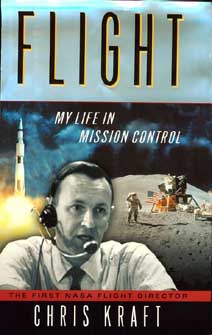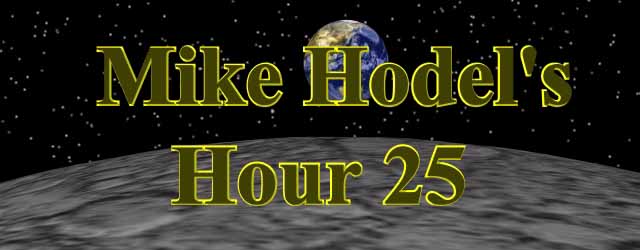| |
|
|
Index to our previous shows
Shows from September, 2002
Shows from August, 2002
Shows from July, 2002
June 21, 2002 - Robert Sawyer
June 10, 2002 - Chris Kraft
Shows from May, 2002
Shows from April, 2002
Shows from March, 2002
Shows from February, 2002
Shows from January, 2002
Shows from December 2001
Shows from November, 2001
Shows from October, 2001
Shows from September, 2001
Shows from August, 2001
Shows from July, 2001
Shows from June, 2001
Shows from May, 2001
Shows from April, 2001
Shows from March, 2001
Shows from February, 2001
Shows from January, 2001
Shows from November - December, 2000
Shows from September - October, 2000
Shows from July - August, 2000
The Great Hour 25 Disk Crash of 2002 - On-Going News
One of the most frustrating losses caused by my hard disk crash has been all of my email correspondence for this year. Now would be a good time to resend any important correspondence that you had sent to me earlier this year.
It would also be very helpful if subscribers to the Hour 25 Newsletter would send resend their email addresses to me {wwjames@earthlink.net} so I can reconstitute the Hour 25 Newsletter mailing list. I may yet recover the last version of the mailing list, but that could take some time. Resubscribing to the free Newsletter would be the fastest way for us to get back in touch.
In the same vein, if you sent in an entry for the Karen Willson Five Word Challenge, now would be a good time for you to fish around in your "sent mail" folder and resend your entry. Or come up with a new one and send it in. {And please put "Five Word Challenge" or some approximation thereof in the subject line of your email to make it easy for me to keep track of your entry.}
We now return you to your regularly scheduled broadcast of Hour 25.
This Week - Robert Sawyer
On Friday - June 21st, 2002 - our guest will be Robert J. Sawyer discussing his newest book Homnids.
|
Alternate History is one of the more popular sub-genres of Science Fiction today. But most of it revolves around cultural Alternate History, not evolutionary Alternate History. {Harry Turtledove's outstanding book No Different Flesh is, of course, an exception to this rule that comes quickly to mind. But then again, Harry just about owns the sub-genre of Alternate History, so what else would you expect?} Nonetheless, books that deal with alternate evolutionary pathways for life on Earth are few and far between.
And now along comes Robert Sawyer's book Hominids, a very engaging story about an alternate Earth where Homo sapiens neanderthalensis, not Homo sapiens, is the dominant intelligence on the Earth. And to make matters more interesting, as well as to create some thorny problems for the characters in the story, he has found a way to bring those technologically advanced Neanderthals into our world. Way cool!
|
|

|
Robert Sawyer is a very talented writer who skillfully combines thought provoking scientific speculations with well crafted characters and situations. In Hominids he shows a world unlike our own populated by a people who are very different from us, but he made it all believable and, just as important, he used this situation to craft an exciting and very enjoyable story. I can't wait for his next book in this series!
Most highly recommended.
|
Listen to this show
|

|
- Click here to listen to the entire show. {1:38:48}
Or
- Click here for the show's intro music.{0:41}
- Click here for the show's opening. {14:34}
- Click here for the Robert J. Sawyer Interview. {1:20:46}
- Click here for the show's closing.{2:47}
Or for more Hour 25 Interviews
- Click here to listen to our interview with Jeremy Bloom discussing Frequency, a Science Fiction Audio Publication.
- To learn more about asteroids and asteroid impact hazards you can listen to our interviews with Dr. Brian Marsden, Dr. John S. Lewis, or Drs. Dave Tholen and Bill Bottke.
- Click here for an index of all Shows on our site.
|
Links for more information relating to this week's show
Robert J. Sawyer
You can find out more about Robert Sawyer by going to his official web site.
You might also be interested in reading this interview with Robert Sawyer from The SF Site or this one from SciFi Dimensions.
You can hear Robert Sawyer reading some excerpts from Hominids by going to SciFi Audio. And if you are interested in listening to other audio Science Fiction stories you should check out the web site for Frequency, an audio Science Fiction Publication. Highly Recommended.
If you enjoyed this show and would like to know when other interviews are uploaded to the Hour 25 web site, then send an email to me at wwjames@earthlink.net and I will add your name to the free Hour 25 Newsletter mailing list. That way you'll get a brief notice in your email every time a new show gets uploaded to the web. {People who have subscribed to the newsletter before should do so again as I am having to regenerate the Hour 25 Newsletter Mailing List following the Great Hard Disk Crash of 2002. «Sigh».}
Concerning the Hugos and Nebulas
Information about the winners of the 2001 Nebula Awards can be found here. I think you'll not be surprised to see that a number of the winners and nominees have been guests on Hour 25 over the last year.
Information about the Hugo nominees for this year, and about ConJose where the winners will be decided, can be found here. Again, it looks like one of your best ways to see who is going to get nominated for a Hugo is to watch and see who has been on Hour 25.
Science and Space News
You can find out how to send your name to an asteroid by checking out this web page from the Planetary Society in Japan. But move quickly, because the deadline for this closes on July 6.
More information about the MUSES-C asteroid mission can be found at the Project's web site. {Note: This link takes you to a page where you can select viewing an English or Japanese version of the site.}
The Japanese Institute of Space and Astronautical Science, a small university organization that is not a branch of NASDA (the Japanese National Space Development Agency, which is their version of NASA), has been developing a small vehicle designed to test the technologies for Vertical Launch - Vertical Landing Single Stage to Orbit rockets. Click here to read more about this project. I am really impressed by how much they have been able to do on a budget that is smaller than the travel budget for a large NASA project.
Click here to learn about the plans of the European Space Agency to fly a vehicle designed to test technologies for a reuseable launch vehicle.
Late Breaking news on Monday's launch from Vandenburg Air Force Base can be found at the Spaceflight Now web site.
Extrasolar Planets
Click here for the press release concerning the discovery of a Extrasolar Planetary System that is strikingly like our Solar System.
You can learn more about a program to discover Extrasolar Planets by going to the California & Carnegie Planet Search web site.
Click here to learn more about another observing program that is discovering Extrasolar Planets.
The Extrasolar Planets Encyclopaedia is a fantastic source of information about the planets outside our Solar System. It is highly recommended.
The Extrasolar Art Gallery has many artists' conceptions for these newly discovered planets along with much other information.
The Astronomy.com web site has has a good article about the discovery of a second planet circling 47 Ursae Majoris.
The Planetary Society maintains a web page about Extrasolar Planets that is a good source of additional information.
Asteroids
The place to start any of your explorations into asteroid science is The Minor Planet Center. This is where astronomers report new asteroid discoveries and it serves as a focal point for disseminating information about asteroids.
Click here to view a web site with a great introduction to asteroids including many images and animations. Another good introduction to what is known about asteroids can be found at this Sky & Telescope web site or at this NASA site.
Click here to visit a web page with information about the double asteroid 90 Antiope. This page includes pictures and movies of this fascinating object.
Click here to go to the home page for the Near Earth Asteroid Rendezvous (NEAR) mission. It is filled with background information about the project and contains reports of the mission's most recent discoveries along with many pictures and movies of 433 Eros.
For more images of asteroids, you should check out this web site from The National Space Science Data Center (NSSDC). Additional data about asteroids can be found at the Planetary Data System Small Bodies Node.
The NEODyS web site contains information about all Near Earth Objects in a searchable database along with web pages for each individual object.
You can obtain orbital elements for any asteroid at this searchable on-line database.
You can find many links leading to many resources concerning asteroids and comets at this NASA GSFC web site and at this site.
You can learn about the asteroid research being done by previous Hour 25 guests Dr. Dave Tholen, Dr. Bill Bottke and Dr. John S. Lewis at their web sites. Dave's Site Bill's Site John's Site.
You can find information to help you in observing asteroids at this web site sponsored by the British Astronomical Association.
Spacecraft missions bring us pictures of asteroids that show details that have never before been seen. And somebody's got to name all of those new details. Go to this web site sponsored by the USGS to find out about the nomenclature being developed for the features seen on asteroids.
Click here to go to the web site for the Near Earth Asteroid Tracking project at JPL.
Information about asteroids that may be dangerous is collected at the JPL Potentially Hazardous Asteroids web site.
Click here to go to a NASA web page discussing asteroid impact hazards. Information about the Torino scale for asteroid impact dangers can be found here.
The Space Frontier Foundation sponsors The Watch, which is a program dedicated to doing something about the hazards presented by asteroid impacts. Click here to find out more about this project.
Additional information about the use of asteroid resources can be found at the web site for the Space Studies Institute, at the web site for Projects to Employ Resources of the Moon and Asteroids Near Earth in the Near Term (PERMANENT) or at this site.
For On-Going Updates on Space News
The Reusable Launch & Space Vehicle News web site web page that is part of the Hobby Space web site is a really good place to watch for news about, well... Reuseable Launch Vehicles and related subjects. I check it out just about every day and often find news there that doesn't show up anywhere else. Give it a look. {And while you're there be sure to check out some of the site's other pages. Wow! Is there a lot of information there.}
The Space Today web site is a great place to find space news from all over the 'net.
The Spaceflight Now web site carries real time information about current space missions and presents a lot of space and astronomy news. This is the place I go to when I want up to the minute information about current space missions. Do I need to say more?
The NASA Watch web site is another great place for getting information about current space missions. Check there also for news about other 'goings on' within NASA. Highly recommended.
ISS News
The Florida Today web site has a very interesting report about the causes of the ISS budget problems and their impact on the space program. It makes very interesting reading.
Click here to view the press kits for various ISS missions.
Check out the NASA International Space Station web page or the Boeing web page to learn more about this project.
A great source of news about Russian space activities, including their work on the ISS, can be found at the Russian Space Web.
Do you wonder where the Space Station is right now? You can use your browser to view real time maps showing the location of the ISS by going to this link at the NASA Space Link web site or here at the Johnson Spacecraft Center. Please note that your browser must support Java to make use of this satellite tracking software.
You can find out when the ISS - or many other spacecraft - can be seen from your location by going to this NASA web page. Please note; your browser must support Java for this application to work.
Click here for information about the audio files used for Hour 25 and for information about configuring your browser and downloading audio players.
Please note web pages from external sites will open in a separate browser window and that Hour 25 Productions are not responsible for the content of any external Web Sites.
|
Return to the Index for this month's shows
|
The Great Hour 25 Disk Crash of 2002 - On-Going News
Work continues on recovering from the Hour 25 Disk Crash, but with my time split between designing rockets, teaching college and doing new shows the process is rather slow.
It would be very helpful if subscribers to the Hour 25 Newsletter would send resend your email addresses to me {wwjames@earthlink.net} so I can start to reconstitute the Hour 25 Newsletter mailing list. I may yet recover the last version of the mailing list, but that could take some time. Resubscribing to the free Newsletter would be the fastest way for us to get back in touch.
In the same vein, if you sent in an entry for the Karen Willson Five Word Challenge, now would be a good time for you to fish around in your "sent mail" folder and resend your entry. I may recover the entry you sent in earlier, but who knows how long that is going to take. {And please put "Five Word Challenge" or some approximation thereof in the subject line of your email to make it easy for me to keep track of your entry.}
We now return you to your regularly scheduled, though delayed, broadcast of Hour 25.
Christopher Kraft
On Monday - June 10th, 2002 - our guest was Christopher Kraft, former Director of the Manned Spacecraft Center in Houston and one of the men responsible for the success of the Apollo Moon landing. We chatted with him about his experiences from the early days of manned spaceflight as well as his book, Flight: My Life in Mission Control.
From today's perspective it is easy to forget that there once was a time when the very thought of going to the Moon conjured up images of the utterly impossible. But until July 20, 1969 that was the case. How a team of skilled and dedicated men and women turned the impossible into reality is one of the most stirring stories from the 20th century.
Chris Kraft was fortunate enough to be in the right place at the right time and with the right mix of skills and ability so that he was able to play a major role in the development of NASA and in the success of the Apollo project. In his book, Flight: My Life in Mission Control, he shares many of his personal experiences from NASA, from their early failures while trying to launch small satellites to their ultimate success when Neil Armstrong first set foot upon the Moon.
|
|

|
But Chris Kraft does not just focus on the past, he also looks to the future. In doing that he discusses how NASA has lost its way and shows what needs to be done to reinvigorate the American space program and set us on track for the next 'giant leap'. His is an inspiring story. It was a pleasure and an honor to have the chance to interview Chris Kraft. I think you'll find him to be a most interesting guest.
Listen to this show
|

|
- Click here to listen to the entire show. {1:11:56}
Or
- Click here for the show's intro music.{0:41}
- Click here for the show's opening. {14:23}
- Click here for the Chris Kraft Interview. {54:38}
- Click here for the show's closing.{2:14}
Or for more Hour 25 Interviews
- Click here for an index of all Shows on our site.
|
Links for more information relating to this show
Chris Kraft and the Apollo Project
There are many great references about the Apollo Project out there on the web. Below are some links to take you to a few of them.
You can find out more about Chris Kraft by going to his official web site.
One of the most interesting web sites that I know of is The Encyclopedia Astronautica. Here you will find a wealth of information about the Soviet and American space programs, focusing on the Race to the Moon as well as numerous other projects. Most highly recommended.
The Apollo Lunar Surface Journal is an amazing web site. Here you will find the complete transcripts for all of the astronaut conversations from the Lunar surface. You will also find images, press information, check lists and other things from the Lunar missions. {You will even be able to view Pete Conrad's checklist complete with the Playboy centerfold that someone added to it with the caption, "See any interesting hills or valleys".
You want to be sure and visit the web sites that NASA created to commemorate the 25th and 30th anniversaries of the Apollo Moon landing.
Much information about the Apollo Project and the various Moon flights can be found at Human Space Flight (HSF) - Apollo History web site sponsored by the NASA history office or at The Apollo Program web site from the National Air and Space Museum.
More information about Lunar exploration by humans and machines can be found at the Exploring the Moon web site from the Lunar and Planetary Science Institute. Information about the scientific data returned by the Apollo project can be found at The Apollo Program (1963 - 1972) web site at the National Space Science Data Center.
You can find many pictures from the Apollo project at the JSC Digital Image Collection - Apollo Project.
Much information about the Saturn V can be found at The Apollo Saturn Reference Page.
The Apollo Project was not the only way we might have gone to the Moon. There were numerous plans and proposals for Lunar - and Mars - missions. You can learn about them at the wonderous web site
Romance to Reality: Moon & Mars mission plans. Highly recommended.
And once your mind is filled with history and your imagination is over flowing with dreams of what might have been.... Step away from your computer and go out some dark night when the Moon is full. Look up. And remember that there once was a time when humans walked on the Moon. Do something to make that dream a reality once more.
If you enjoyed this show and would like to know when other interviews are uploaded to the Hour 25 web site, then send an email to me at wwjames@earthlink.net and I will add your name to the free Hour 25 Newsletter mailing list. That way you'll get a brief notice in your email every time a new show gets uploaded to the web. {People who have subscribed to the newsletter before should do so again as I am having to regenerate the Hour 25 Newsletter Mailing List following the Great Hard Disk Crash of 2002. «Sigh».}
Concerning the Hugos and Nebulas
Information about the winners of the 2001 Nebula Awards can be found here. I think you'll not be surprised to see that a number of the winners and nominees have been guests on Hour 25 over the last year.
Information about the Hugo nominees for this year, and about ConJose where the winners will be decided, can be found here. Again, it looks like one of your best ways to see who is going to get nominated for a Hugo is to watch and see who has been on Hour 25.
For On-Going Updates on Space News
The Reusable Launch & Space Vehicle News web site web page that is part of the Hobby Space web site is a really good place to watch for news about, well... Reuseable Launch Vehicles and related subjects. I check it out just about every day and often find news there that doesn't show up anywhere else. Give it a look. {And while you're there be sure to check out some of the site's other pages. Wow! Is there a lot of information there.}
The Space Today web site is a great place to find space news from all over the 'net.
The Spaceflight Now web site carries real time information about current space missions and presents a lot of space and astronomy news. This is the place I go to when I want up to the minute information about current space missions. Do I need to say more?
The NASA Watch web site is another great place for getting information about current space missions. Check there also for news about other 'goings on' within NASA. Highly recommended.
ISS News
The Florida Today web site has a very interesting report about the causes of the ISS budget problems and their impact on the space program. It makes very interesting reading.
Click here to view the press kits for various ISS missions.
Check out the NASA International Space Station web page or the Boeing web page to learn more about this project.
A great source of news about Russian space activities, including their work on the ISS, can be found at the Russian Space Web.
Do you wonder where the Space Station is right now? You can use your browser to view real time maps showing the location of the ISS by going to this link at the NASA Space Link web site or here at the Johnson Spacecraft Center. Please note that your browser must support Java to make use of this satellite tracking software.
You can find out when the ISS - or many other spacecraft - can be seen from your location by going to this NASA web page. Please note; your browser must support Java for this application to work.
Click here for information about the audio files used for Hour 25 and for information about configuring your browser and downloading audio players.
Please note web pages from external sites will open in a separate browser window and that Hour 25 Productions are not responsible for the content of any external Web Sites.
|
Return to the Index for this month's shows
|
Back to Hour 25 Home Page
Unless otherwise noted the entire content of this web site is Copyright © Warren W. James, 2000-2002.
All rights reserved.
|
|




